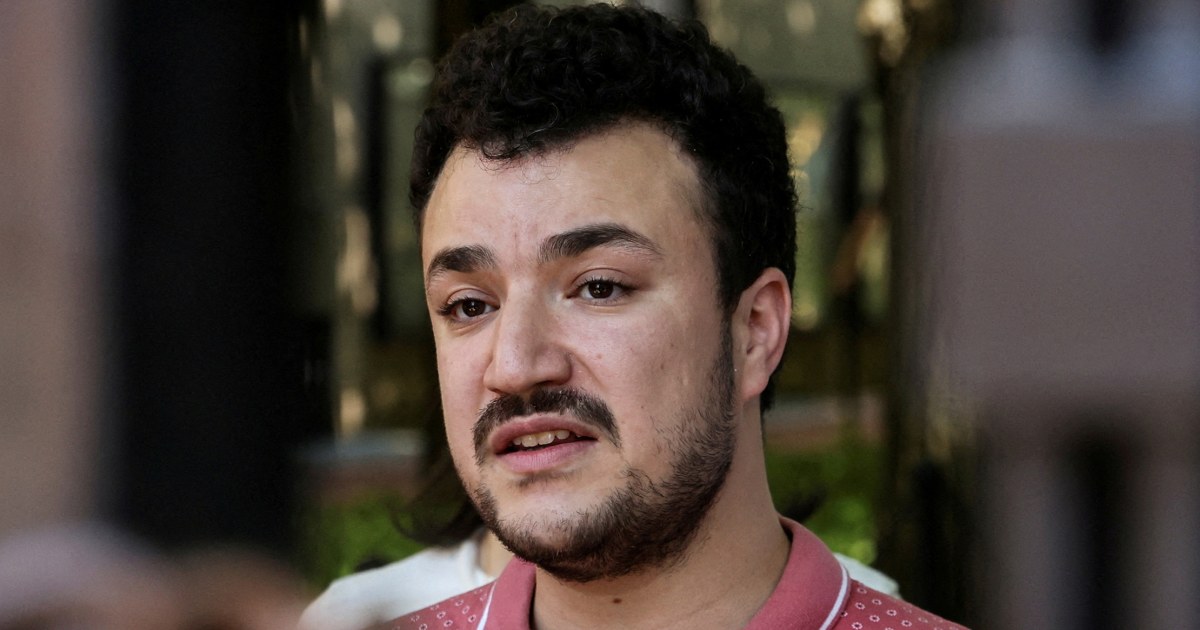Mahmoud Khalil and his attorneys tell judge his life, his family’s would be at risk if he’s deported

Columbia University student Mahmoud Khalil should be protected from deportation, which could put his life at risk, his attorneys argued Thursday.
Ahead of a critical court hearing before an immigration judge in Louisiana that focused on whether Khalil was entitled to relief from deportation, including through asylum, Khalil met and held his newborn son for the first time. The Trump administration had sought to have the two separated by a plexiglass barrier.
“His life is at stake,” Khalil’s attorney, Marc Van Der Hout, said.
Khalil testified before the judge for more than two hours Thursday, describing his life from his childhood and journey to Columbia University to his campus activism, where he was a prominent pro-Palestinian voice during last year’s demonstrations.
“I spent a good time of my life fleeing from harm and advocating for the marginalized. That’s what put me in danger,” he said. “That is what I was protesting, that is what I will continue to protest. This is what everyone should protest.”
He also said his own safety and his family’s would be in jeopardy if they were removed from the United States.
Khalil said that returning to Syria “would be suicide.”
“I’ve been targeted for my political beliefs,” he said. “The president labeled me as a terrorist sympathizer.”
When asked what he was afraid of if he were to be deported, Khalil said, kidnapping, assassination, torture or targeting of his family.
He said he is most concerned about his family, because if he were deported, he would not want them to come with him for fear of their safety.
“I’ve only spent one hour in one month of my son’s life, and that was this morning,” he said.
Khalil was targeted for deportation by the Trump administration after he helped organize pro-Palestinian rallies on Columbia’s campus. He has been detained at a facility in rural Jena, Louisiana, since March.
Khalil is an Algerian citizen of Palestinian descent; he was born in a Palestinian refugee camp in Syria. He was a green card holder when he was detained. Trump Administration officials invoked a rarely used provision in immigration law saying the Secretary of State has the authority to deport someone who is determined to have “serious adverse foreign policy consequences for the United States.”
Immigration Judge Jamee Comans asked that the testimony Thursday focus on Khalil’s application for asylum.
“All I want to hear is why he can’t go to Syria or Algeria,” she said during the hearing.
His attorneys called multiple expert witnesses on the Middle East and North Africa to testify that Khalil could be targeted by foreign governments, suffer persecution or torture if he were deported to Algeria or Syria.
If the judge denies Khalil’s applications for relief and reaffirms that he is removable from the U.S., Khalil’s legal team can appeal.
Before Thursday’s hearing, Khalil’s attorneys submitted hundreds of pages of new evidence opposing his deportation, which NBC News has reviewed.
The evidence included several expert declarations from organizations and academics stating that Khalil’s life would be in danger if he were deported to Algeria or Syria.
In a letter from Amnesty International, the organization said it “oppose all forced returns of Syrian nationals and former habitual residents of Syria, including Palestinians, to any part of Syria,” adding the situation there “remains incredibly volatile.”
In another letter, Muriam Haleh Davis, an Algerian historian and associate professor at the University of California, Santa Cruz, said Khalil would also be at risk in Algeria, writing that “Israel has a well-known history of assassinating pro-Palestinian intellectuals and politicians in North Africa.”
“Mr. Khalil, due to his visibility and the false allegations of his involvement with Hamas, could very well be a target,” Davis said.
Ahead of the hearing, Khalil was allowed to meet and hold his one-month old son, Deen, for the first time and meet with his wife, Dr. Noor Abdalla, for the first time since he was detained from his New York City apartment lobby.
Initially, Trump administration officials declined Khalil’s request for a “contact visit,” citing a “no-contact” visitation policy at the Central Louisiana ICE Processing Center and security concerns.
After negotiations, officials agreed to a “contact visit,” Khalil’s legal team said.
Khalil’s wife and newborn were also in the courtroom later Thursday. The baby occasionally fussed, and Khalil turned around and smiled at his wife and son.
“Khalil had a contact visit with his wife and child this morning before his court hearing. But we’re offering him even more: use the CBP Home app to self-deport,” Department of Homeland Assistant Secretary Tricia McLaughlin said Thursday night. “The United States is offering illegal aliens $1,000 apiece and a free flight to self-deport now, which Kahlil can take advantage of by scheduling his departure through CBP Home.”
Khalil has not been accused of criminal conduct, but the Trump administration has argued it has the authority to deport him because he “led activities aligned to Hamas, a designated terrorist organization,” a claim which Khalil and his legal team deny.
NBC News reviewed more than 100 pages of documents the federal government submitted in its effort to deport Khalil, which showed that the government appeared to rely on unverified tabloid articles about him.
In April, Comans affirmed the Trump administration’s argument that Khalil’s beliefs threaten national security and justify his deportation.
Khalil’s attorneys on Thursday asked the judge to terminate the immigration proceedings, arguing that he was arrested without a warrant. However, the judge denied the motion.
After hours of testimony, the judge instructed both parties to submit written closing arguments by June 2. As of now, Khalil will remain detained in Louisiana.
